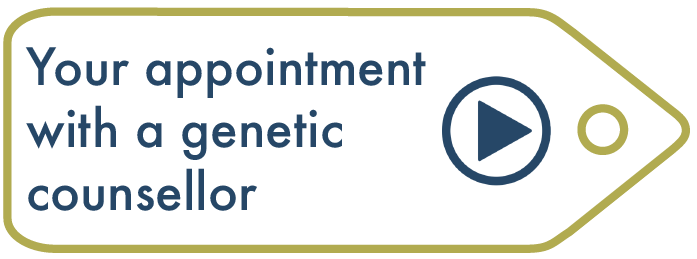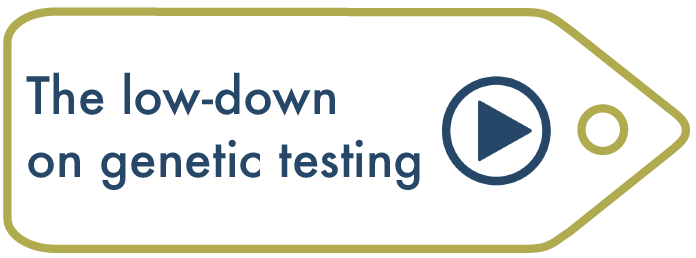Genetic Counselling
Genetic Counsellors provide up to date information and support to individuals and families that may have an inherited predisposition to disease. At the New Zealand Family Cancer Service (NZFCS) the Genetic Counsellors specifically assess cancer risk based on an individual’s personal cancer history or a family history.
Between 5 and 10% of all cancers are hereditary, which means that changes (or mutations) in specific genes are passed from one blood relative to another. People who inherit one of these gene changes will have a higher risk of developing cancer at some point in their life. Genetic counselling can help people understand this risk, discuss options and risk management if appropriate. They will provide both verbal and written information and support individuals in decision making and discuss the implications of risk and genetic testing if it is appropriate.
Genetic Counsellors will provide information and address emotional and psychological issues brought up only in relation to the assessment and testing.
In most cases, people who need genetic counselling fit into one of two groups:
Group One
Includes people who are cancer-free but, due to other medical conditions or family history, may have an increased risk for developing cancer.
Group Two
Includes people who are already diagnosed with certain cancers and want to know if it is genetic. Your doctor has asked you to be seen by a genetic counsellor as this might have impact on treatment decisions.
Who are genetic counsellors?
Genetic counsellors are health professionals with a post graduate degree and experience in the areas of medical genetics and counselling. Most counsellors enter the field with a background in biology, genetics, nursing, psychology, public health or social work. There are strict guidelines for Genetic Counsellors. Our Genetic Counsellors are Certified with the Australasian Society of Genetic Counsellors and fellows of the Human Genetic Society of Australasia.
What happens during the consult?
Medical and family history review
During a genetic counselling session, a genetic counsellor will review your medical history and take your family history. They will ask questions about your family cancer history and sometimes other medical conditions, so it is important to have as much medical information as possible about both sides of your family.
It may be necessary to get further information on some diagnoses in the family so they can properly assess any risk. The genetic counsellor will use this information to provide a risk assessment on whether you could have an inherited condition that causes a higher than usual risk for cancer.
Genetic testing discussion
The counsellor may also talk to you about genetic testing. Genetic tests use a patient’s blood or saliva sample to look for genetic changes (mutations) that may lead to an increased risk for some cancers. After the medical and family history review, the counsellor will discuss whether genetic testing is right for you. They will also cover the ethical and legal issues of genetic testing. If the counsellor recommends genetic testing, you will be given information about the appropriate test (or tests) and the process for being tested.
Cancer screening and prevention recommendations
Based on your family history and/or genetic test results, we will discuss ways to manage your cancer risk. This discussion may cover cancer screening strategies, chemoprevention or even risk reducing surgery. You also may be referred to one of our specialists for further discussion and long-term cancer screening and monitoring.
Should I consider having cancer genetic counselling?
Group 1 – Cancer Free but at Increased Risk
You should consider seeing a genetic counsellor for a cancer risk assessment if your personal and/or family history includes signs of hereditary cancer. Hereditary cancers tend to differ from non-hereditary cancers so individuals may consider seeking advice if there is a history of:
- A first degree relative (parent, sibling or child) is diagnosed with a cancer at a younger than usually seen in the general population (often younger than age 50)
- 2 people from the same side of the family with the same or related types of cancer
- A relative has had a primary cancer more than once.
- Family history of rare cancer
Additionally, people with the following should consider genetic counseling;
- Breast or ovarian cancer diagnosis with Ashkenazi Jewish ancestry (Eastern or Central)
- Polyposis (multiple polyps in the colon, stomach or small intestine). Polyps are small growths in the bowel that are not uncommon. However, it would be more unusual if a family member has had many of these found on one occasion or over time
- A family member with a genetic test diagnosing a hereditary cancer syndrome
Group 2 – includes people who have a Cancer Diagnosis and want to learn if it is genetic
Not everyone with cancer needs genetic counselling, though. Instead, it is usually recommended for patients who have;
- Developed cancer at an earlier age than usual for their disease
- Been diagnosed with two or more separate cancers
- Developed a rare type of cancer, such as male breast cancer, soft tissue or bone cancers or medullary thyroid cancer
- Family history of the same or related type of cancer.
- Have some forms of ovarian cancer that genetic mutation can impact treatment



